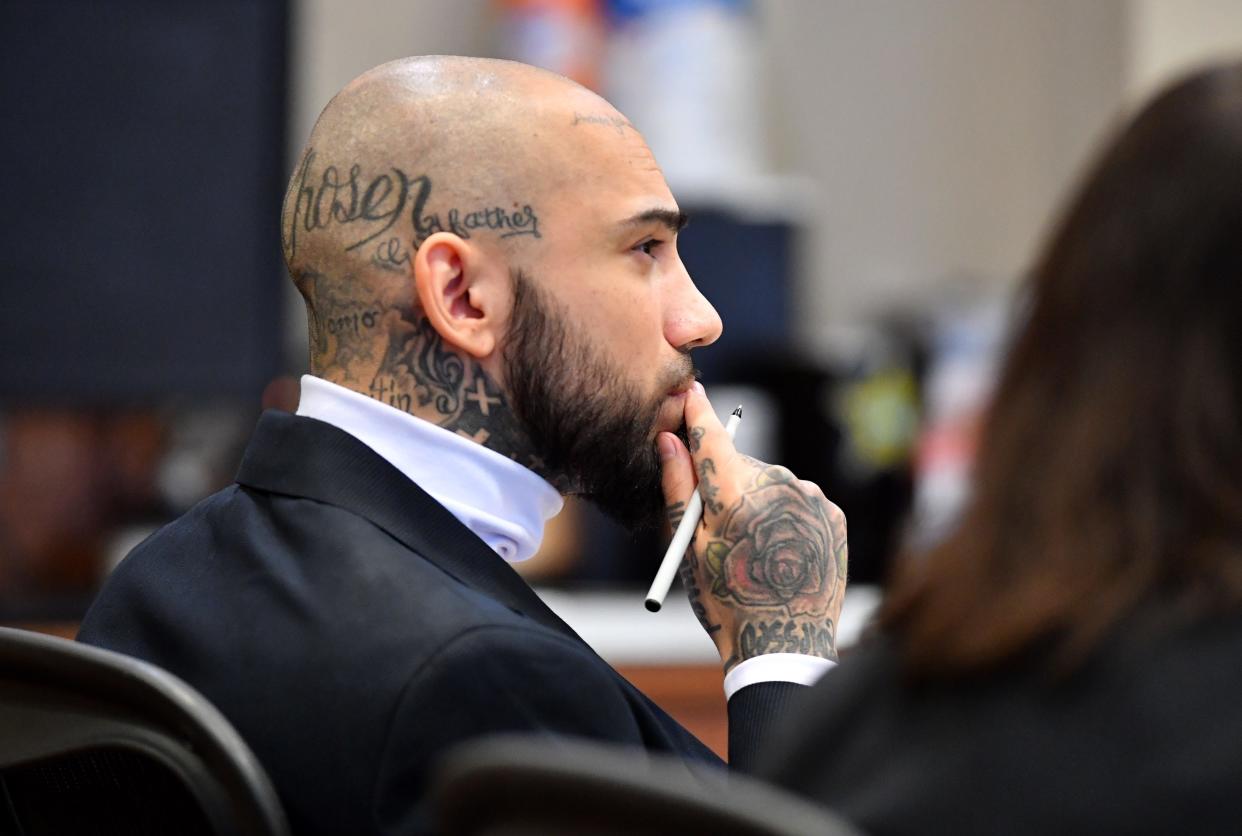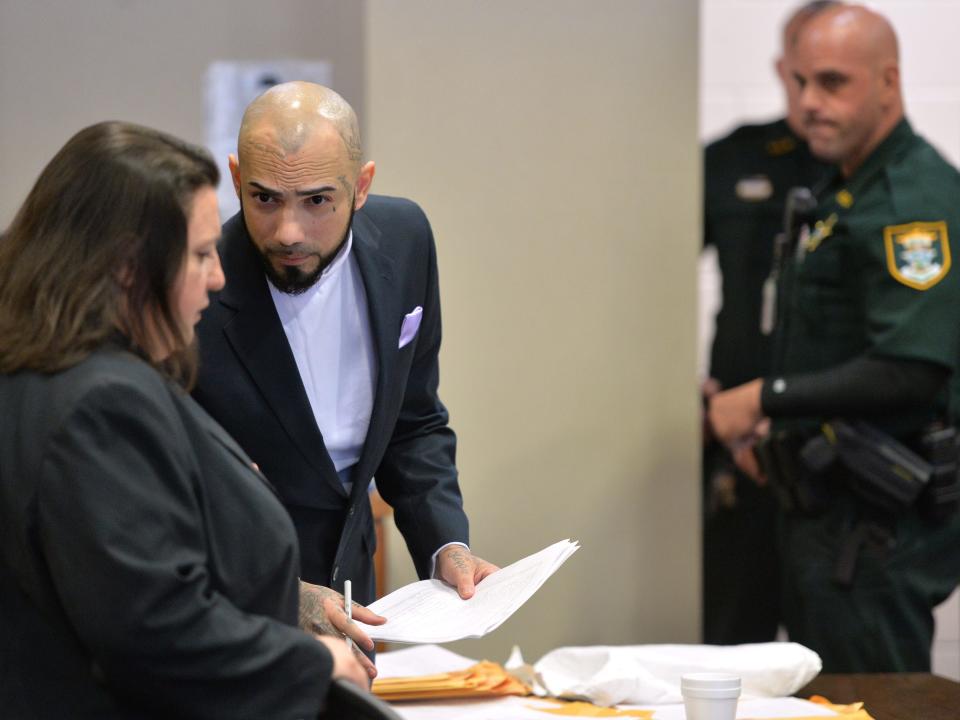Sarasota jury finds Punta Gorda man guilty of murder, grand theft auto in 2018 murder case

Ill will. Hatred. Spite. Evil intent.
"It takes those attributes to fire a gun into Tyren Kinard's right eye," Assistant State Attorney Karen Fraivillig said during her closing arguments Friday during the trial of a Punta Gorda man accused of murdering a 21-year-old Black gay man in September 2018 in North Port.
Sitting a few feet away at the defendant's table, Juan Jose Salazar-Diaz stared at Fraivillig as she concluded her arguments. The 26-year-old opted to represent himself during the trial.
"Hold him accountable for killing that other 20-year-old," Fraivillig said.
After approximately two hours of deliberation, a jury of six came back with a guilty verdict for both second-degree murder and grand theft auto.
Just before Fraivillig's conclusion, Salazar-Diaz's closing focused on discrediting the lead detective's investigation, the fact that experts couldn't say when his DNA and fingerprint were placed in the victim's car and on a pack of Newport cigarettes collected near Kinard's body, the fact that one witness said Kinard was going to see someone named "Quan," and that his parents placed him at their home during the time of the killing.
In case you missed it: Zieglers sue to stop release of records from rape, voyeurism investigation
In Manatee County news: Bradenton man sentenced to 30 years in prison in connection to 68-year-old father's murder
Fraivillig urged the jury to not only consider the witnesses who spoke from the stand — the ones who can be rattled, get confused, and lie — but to also focus on the "silent witnesses," the evidence like DNA, fingerprints and photographs that don't forget and do not have a stake in the outcome of the trial.
The case presented to a six-person jury to deliberate hinged on circumstantial evidence collected from the crime scene where Kinard's body was found lying face down on Sawyers Circle near Red Oak Road in North Port. Kinard, 21, had been shot several times and his car, a silver Chrysler 200 sedan, was found abandoned a day later on Explorer Road with two apparent gunshot holes in the driver’s side window.
Salazar-Diaz was arrested in December 2018 in connection to the shooting death following a four-month investigation by North Port police and charged with murder in the second degree, grand theft auto and possession of a firearm by a convicted felon.
Salazar-Diaz became a suspect after police identified him through a fingerprint which investigators found on a plastic sleeve of a Newport pack of cigarettes collected at the scene where Kinard’s body was found.
The third count, possession of a firearm by a convicted felon, was severed from the case and Fraivillig has decided not to prosecute that charge. Fraivillig said the decision to not prosecute stems from Salazar-Diaz being in jail for five and a half years already, which is longer than what the mandatory minimum would be for the charge, and to not waste the judicial system's time since he will most likely receive a severe sentence in this case.
"This case was compromised of only circumstantial evidence, but the circumstantial evidence, in and of itself, ... was overwhelming that the defendant was the one that committed the crime," Fraivillig said.
A sentencing hearing will be scheduled sometime within the next 30 days, at which point Kinard's family will be able to share a statement.
Since Salazar-Diaz has six prior felony convictions and had only been released from prison about seven to eight months before the crime was committed, he is eligible to be sentenced to mandatory life under the prison releasee re-offender law.
For the family, the last five and a half years have been a lot of anguish and anxiety due to a suppression issue by a previous judge and lengthy pre-trial motions after the defendant decided to represent himself, Fraivillig said.
"But their faith in the system paid off," Fraivillig said. "Although we always say, and it's a cliche, we always say that nothing can bring their son back. Of course, that's very true. But at least they know somewhere that the system works and there is justice in the world, that it's not just chaos out here ... justice can be had. Like my colleague Mr. (Steven) Westphal says, 'The wheels of justice grind slowly, but they grind exceedingly fine.'"

Defendant takes stand, calls parents as alibis
Salazar-Diaz took the stand as a final witness in his defense Thursday afternoon, following his mother and father who had been called as alibis for his whereabouts on the night of Sept. 7 into Sept. 8, 2018.
Salazar-Diaz told the jury that he had previously lied to detectives in the case when he denied knowing Kinard, but that he had written to a judge to apologize for lying.
The defendant admitted he recalled Kinard calling and texting him the night of the crime, but the two hadn't had plans to meet as Salazar-Diaz said he wasn't a gay man and never had sexual relations with men. He added that he'd known Kinard previously and had even been in Kinard's car before, explaining that's how the glove with his DNA ended up in the car.
Before resting the State’s case, Fraivillig called on Florida Department of Law Enforcement crime laboratory analyst Maureen Meehan, who was able to exclude another suspect in the case and confirm that Salazar-Diaz’s DNA was found on one item of evidence.
While Meehan was able to confirm that Salazar-Diaz’s and Kinard’s DNAs were both present on the latex glove found within Kinard’s car, when questioned by Salazar-Diaz during cross about if his DNA was found on the steering wheel or gear shift of the car, Meehan said only Kinard’s DNA was found in those two places.
Salazar-Diaz called on his father, Juan Ricardo Salazar, to testify about speaking with North Port police in November and December 2018.
Testifying through an interpreter, Ricardo Salazar told the jury he was asked three questions, including if he knew the victim and where his son worked. In response to Salazar-Diaz asking his father if detectives questioned him as to where his son was the night of the murder, Ricardo Salazar said they hadn’t.
Appeals court: No new trial in Venice discrimination case levied by Black officer
More court news: Sarasota litigation attorney appointed to County Court position in 12th Judicial Circuit
During questioning by the prosecution, Ricardo Salazar testified that he hadn’t been home the night of Sept. 7, 2018, but that his wife had been with Salazar-Diaz.
He added that he had been on a video call with his son and wife between 11:30 p.m. and midnight that night and that he had proof that his son was home.
When Fraivillig pushed why he hadn't come forward to detectives with the proof he claimed he had in defense of his son, Ricardo Salazar said the detectives didn't leave a number for him to call, that he had provided the proof to his son's first attorney and that he wasn't the one being accused.
Ricardo Salazar also testified that he did not allow guns in his home as he had a young daughter. In response, Fraivillig pulled up photographs taken on Dec. 19, 2018, when investigators executed a search warrant on the home, and photos pulled from Salazar-Diaz's Google photos.
The first set of photos depicted a living room in the family's apartment which included a distinctly patterned chair and photos of what was identified as Salazar-Diaz's bedroom which included bedding that had a distinct blue and white pattern. The two photos from the Google folder showed an individual holding a gun in front of both the distinct bedding and the chair.
“I don’t know anything about the gun," Ricardo Salazar said through the interpreter, adding, “I never saw a gun in my house.”

When Fraivillig pressed about him seeing the photo of the gun in front of the distinctive bedding that matched the bedding on his son's bed in their home, Ricardo Salazar held firm that while he saw the gun in the photo, he wasn't sure if it's real or not.
Salazar Diaz’s mother, Olideinis Gonzalez Diaz’s testimony echoed that of her husband with the exception that she said she was home with her son the night of the shooting when the supposed video call with family happened.
Gonzalez Dias, through an interpreter, also denied speaking with police in December 2018 when they came to search her home, stating that she doesn’t speak English so she couldn’t have talked with police.
As was previously done with her husband, a recorded interview between a North Port police officer and Gonzalez Diaz was played outside the presence of the jury to refresh the witness’s recollection that she did speak with police through another officer who translated between English and Spanish. In the audio, Gonzalez Diaz told police her son moved in with them after he got out of jail previously.
Gonzalez Diaz testified that her son was home the night of the murder, that no one knocked on their door and that the two had video called with Salazar-Diaz's father and their family in Miami. Similar to her husband, when asked why they hadn't given the video or log to the police, Gonzalez Diaz couldn't give a straight answer, saying police never asked for it and that they had given it to their son's first attorney.
Fraivillig pointed out in closing arguments how it was convenient that the video disappeared and how despite saying he had it on his phone in his car, Salazar-Diaz's father didn't produce the evidence during the trial.
Circuit Court Judge Thomas Krug denied both of Salazar Diaz’s motions for judgment of acquittal following the State resting their case Thursday and his second motion Friday morning.
Gabriela Szymanowska covers the legal system for the Herald-Tribune in partnership with Report for America. You can support her work with a tax-deductible donation to Report for America. Contact Gabriela Szymanowska at gszymanowska@gannett.com, or on X: @GabrielaSzyman3.
This article originally appeared on Sarasota Herald-Tribune: Punta Gorda man found guilty of murder, vehicle theft in 2018 murder

